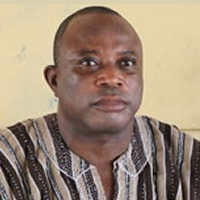The New Juaben North Municipal Assembly performs its functions in accordance with Article 242 of Ghana’s 1992 Constitution and Local Government Act of 2016, Act 936. The MA in the performance of its functions work through various committees, the these are the Executive Committee which is being chaired by the Municipal Chief Executive and the Public Relations and Complaints Committee (PRCC) chaired by the Presiding Member . The executive committee of the assembly has a number of sub-committees working under them.
These are;
1. Development Planning
2. Social Services
3. Works
4. Justice and Security
5. Finance and Administration
6. The Chairperson of one ad hoc Sub-Committee of the Executive Committee elected by the Assembly and
7. Any two members of the Assembly elected by members of the District Assembly at least one who is a woman.
The General Assembly of the New Juaben North Municipal Assembly is composed of thirty-one (31) members made up of;
Municipal Chief Executive (MCE)
Twenty (20) elected assembly members (19 males and 1 female)
Nine (9) government appointed assembly members (7 males and 2 females)
One (1) Member of Parliament (MP) representing New Juaben North constituency.
The Assembly has a Presiding Member who is elected by two-thirds of all the members of the assembly. He Chairs the Assembly meetings as well as the Complaints Committee.
The municipal has five (5) Zonal Councils namely;
Effiduase
Asokore
Oyoko
Jumapo/Asikasu /Suhyen
Akwadum
The Assembly has twenty (20) Electoral Areas these are; Sukuumu-Effiduase, Daman, Ogua-Effiduase, Adumasa, Gyamfikrom-Asokore, Sukuumu-Asokore, Fofie-Asokore, Zongo-Asokore, Abrodua-Asokore, Ntano Asokore, Asamang-Oyoko, Asuogya, Adaneagya - Oyoko, Zongo-Oyoko, Ahenebronom-Jumapo, Yaane, Suhyen, Asikasu, Akwadum, and Eddi Mensah.
The administration of the municipal is under the leadership of the Municipal Chief Executive who is the political and administrative head. The MCE is assisted by the Municipal Co-ordinating Director who is a secretary to the General Assembly and Executive Committee as well as providing technical support to the technical departments. The departments of the Assembly which have been established are:
1. Central Administration
2. Disaster Prevention and management
3. Agriculture
4. Social Development
5. Works
6. Physical Planning
7. Finance
Additionally, departments such as:
8. Education
9. Health
10. Trade & Industry
11. Natural resource conservation and wildlife are yet to be established.
Other Government Departments/Institutions that are in existence within the municipal are;
· Information Service Department
· Birth and Deaths Registry
· Statistical Service
· Ghana Police Service
· Ghana Fire Service
However, most of these departments face challenges such as; inadequate staffing, poor office accommodation among others.
Social Accountability
Decentralization is seen as an important mechanism for strengthening local democracy and improving service delivery. It has helped to transfer development and governance of local communities to Assemblies making participation by ordinary citizens governing process practical and possible. The participation and engagement of citizens in decision-making is the hallmark of democracy. Citizen’s participation is therefore a right guaranteed by the constitution of Ghana which places ultimate power in the people.
Popular participation seeks to promote local democracy, participation and accountability through strong and viable stakeholder involvement, clarifies and strengthens the roles and relationships between state and non-state actors in the decentralisation agenda (Ghana, NPPF 2016).
The Assembly has several platforms which serve as very good opportunities for citizens to participate in its development agenda. Some of these channels which exist within the Assembly are;
Public Planning Hearing (DMTDP)
Public Budget Hearing
Stakeholder/Ratepayers Fee -Fixing Consultation
Validation and Review Forums
Notice Boards (MA and Sub - Committee Meetings, Revenue Charts, Gazetted Fee Fixing Resolution, Announcement of Jobs, Appointments, Procurement Awards, etc of public interest.
Town Hall and Community Meetings
Information Sharing Session
Public Sitting of MMDAs
Zonal Councils and Unit Committee Meetings
Open Days
Policy Fairs & Policy Review Clinics
Websites (Active and Interactive)
Exhibition of Development Projects
Bulk SMS Text Messages
Regularly updated online directory
Annual Social Audit
However, some of these platforms are not functional or are weak in its engagement. The sub-district structures are not well resourced with a number of them lacking office accommodation and personnel. Notwithstanding, engagement with other interest groups such as; the Traditional Authorities, Assembly members, Religious groups and some NGO’s are very encouraging with their efforts in strengthening and promoting citizens participation in development planning and budgeting.
Development Implications - Governance
· Opportunities are provided to stakeholders to voice their opinions and participate in their local governance by participating in
the preparation of MTDP thereby producing a plan that meets the needs and aspirations of the people.
· Promotes transparency and openness of activities of the Assembly thereby lending credibility to the Assembly.
· The governance structure improves the quality of decision making at the Assembly.
WATER SECURITY
Fresh water is crucial to human society, not just for drinking but also for farming, washing and many other activities. The main source of drinking water is pipe borne followed by sachet.
Water delivery for domestic and industrial purposes is supplemented by rain harvesting, rivers, streams and dug-outs. The River Densu is the main source that supplies water for treatment and delivery to the municipality and satellite communities. Rainwater harvesting is carried out basically at household level and in few institutions even though the option is viable in view of the high rainfall pattern in the Municipality.
Currently, two (2) piped water systems supply potable water to the municipal capital and its environs. The AVRL system sources its water from Densuano and treated for distribution to a number of communities in the municipality. The Community Water and Sanitation Agency (CWSA) is another agency with the mandate to facilitate the provision of safe drinking water and related sanitation services to rural communities and small towns. The agency is located in the municipal over the years and provided boreholes and water systems to some communities.
Other organisations operating in the municipal and have made significant impact in the provision of water are JICA and DANIDA.
Water availability is expected to become increasingly scarce in the future, and this is partly due to climate change. Climate change is likely to lead to reduced rainfall in the coming years. The effect of which is an intensification of the water cycle that may cause more extreme floods or droughts. This will further result in the drying of our water bodies which serve as sources of water for domestic use in some communities thereby resulting in the population facing water scarcity in the near future.
Implication for Development – Water Scarcity
For communities who rely on streams and rivers as their main sources of drinking water are prone to water-related diseases such as diarrhoea, typhoid fever, guinea worm and schistosomiasis. The problem could be aggravated by a high population growth rate and a seemingly lack of capacity on the part of the responsible agency, the Ghana Water Company, to keep pace with the rate of demand.
Women and children are affected the most during water scarcity as they will have to spend more time walking longer distances to get potable water.
NATURAL AND MAN- MADE DISASTERS
The major natural and man- made disasters that have plagued the New Juaben North Municipality are flooding, fire-out breaks and rainstorms/wind storms. The man- made ones are mostly domestic fire outbreaks. With regards to flooding; High ways, Asokore Zongo, Akwadum Zongo, Asakore-Kuma, Oyoko R/C and OMESS, Rema house among others are identified as flood - prone areas in the municipal area.
The perennial flooding in these areas has been attributed to the construction of buildings in waterways, dumping of refuse in narrow gutters and drains. More so, most of the existing gutters are narrow and so cannot receive large volumes of water whenever there was a heavy down pour. The effect has been the loss of life and valuable properties in these areas.
Another major natural disaster in the municipal is rainstorm. Areas mostly affected are Effiduase and Oyoko. These areas are mostly affected because of the rapid deforestation resulting in inadequate trees to serve as windbreaks and also poor construction of houses.
Fire Outbreak
Fire outbreaks in the municipal are principally domestic and institutional. Actions of man related to these outbreaks are weak and naked wiring of houses, un-switched off electricity gadgets while out of the house, overloaded meters and gas explosion.
The major challenge confronting the fire service in combating fire in the Municipal has been poor accessibility to properties. Most areas in the Municipal are not easily accessible. Roads have been encroached by developers and temporal structures constructed on pavements.
Implications for Development
The impacts of disasters such as flooding, fire outbreaks and storms in the municipal area affects economic activities, academic work and health care delivery. People will have to abandon their homes and seek shelter elsewhere. Consequently, funds that should be spent on projects would have to be diverted to manage disaster cases.
Additionally, the situation deters individuals, institutions and private investors in investing in flood prone areas.
NATURAL RESOURCE UTILIZATION
The Municipal Assembly is endowed with natural resources such as granite, sand, clay and rivers/streams. These resources are being exploited as demand for sand and gravel continues to increase. Sand winning and stone quarrying are important economic activities which are threats to the environment. Environmental issues are gradually becoming high as development and environment are inseparable.
Sand Winning
Contractors and individuals have subjected farm fields to very intensive sand winning activities at Akwadum and Mpaem areas. This has resulted in environmental damage and loss in agriculture productivity. Sand wining in the municipality has negative effects on the environment, farming and health. Other direct effects include land degradation and destruction of roads by heavy trucks and air pollution.
Notwithstanding, sand winning has positive effects which are; a source of income for land owners, a source of revenue for the Municipal Assembly, building materials for construction and a source of employment for the youth. In view of this maximum benefits should be obtained from the activity with ecological consideration in mind.
Date Created : 3/27/2019 4:19:50 AM






 facebook
facebook twitter
twitter Youtube
Youtube TOLL FREE 0800 430 430
TOLL FREE 0800 430 430 +233 593 831 280
+233 593 831 280 GPS: GE-231-4383
GPS: GE-231-4383 info@ghanadistricts.com
info@ghanadistricts.com Box GP1044, Accra, Ghana
Box GP1044, Accra, Ghana